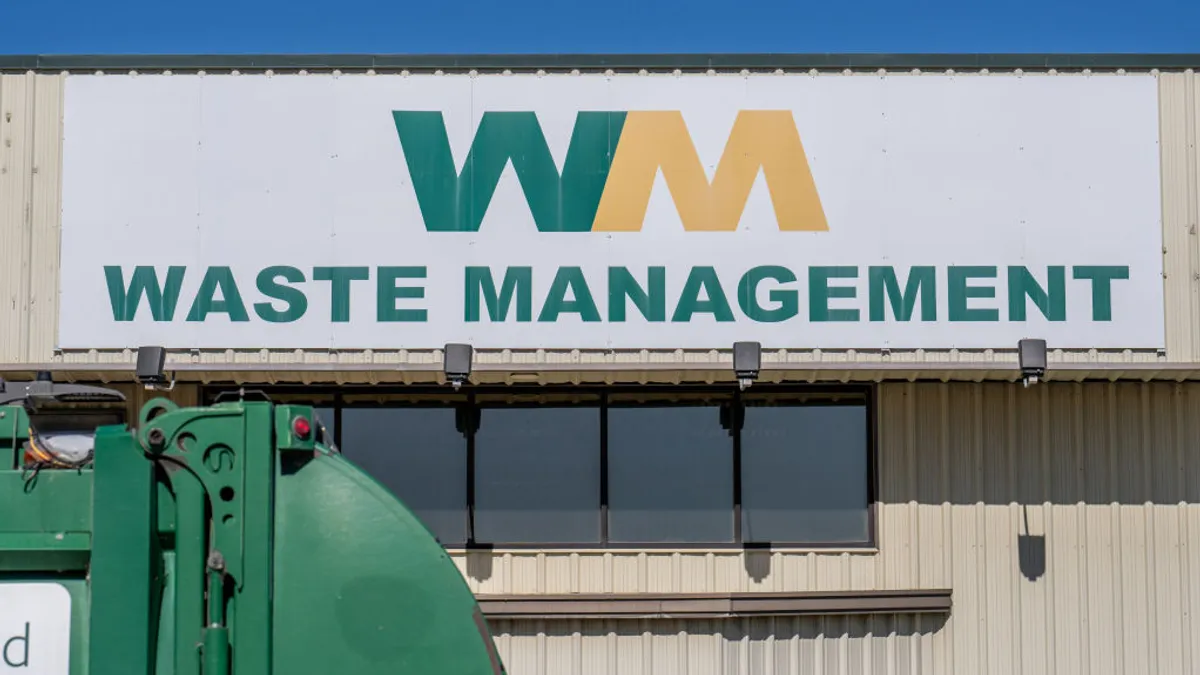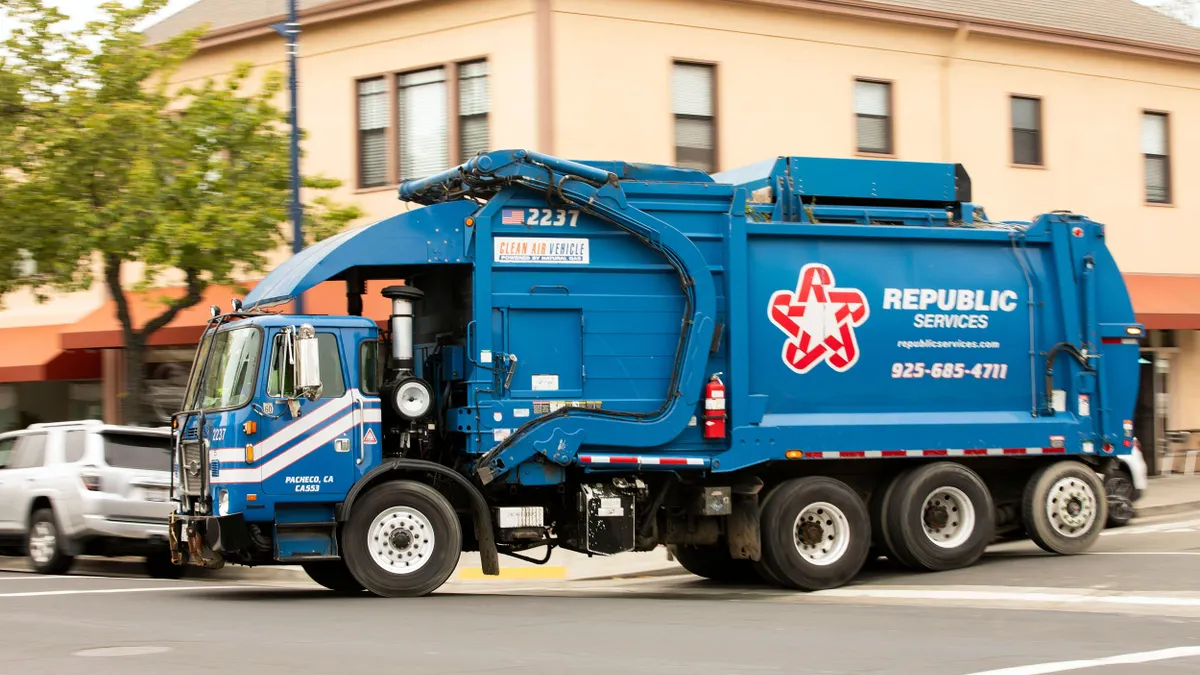Welcome to Scrap Collector, Waste Dive's Friday round-up of insights and stories you may have missed during the week.
In a June interview with Waste Dive, global waste activist Von Hernandez highlighted the recently ratified Basel Convention amendment — which requires importing countries to give prior informed consent before plastic scrap exports can enter their borders — as a reason to retain optimism in the face of rapid environmental degradation.
The U.S., it seems, disagrees. The country has formally opposed the Organization of Economic Cooperation and Development's (OECD) plans to adopt the amendment — the only one of 36 member nations to do so.
Per organization policy, new Basel Convention definitions are automatically adopted after a 60-day period unless objected to by one or more OECD members. The U.S.'s move, according to a press release from the Basel Action Network, will trigger "a lengthy debate within the OECD with a view to reaching consensus" — without which the U.S. could bar the OECD's 35 other member nations from adopting the rules.
Accepting the restrictions "would impede trade for recycling and could reduce the level of recycling among OECD countries," U.S. EPA Administrator Andrew Wheeler wrote in a July 3 objection letter, noting that OECD members "have the capacity to manage waste in an environmentally sound manner."
"As a result [of adopting the amendment], in OECD countries, plastic recycling could decrease and landfilling of plastic scrap could increase, reducing the environmental and economic benefits that are achieved through recycling," an EPA spokesperson told Waste Dive via email.
"Restricting trade does not solve the true causes of pollution that result from poor waste management and careless human behavior," Adina Renee Adler, assistant vice president of international affairs at the Institute of Scrap Recycling Industries (ISRI), told Waste Dive in an email. "The OECD will be an important venue to direct the international community's attention toward proper information about the value of end-of-life materials and how to ensure they are responsibly recycled."
According to Jan Dell, founder of nonprofit The Last Beach Cleanup, Wheeler's objection letter contains several misleading statistics and statements. While the letter asserts that "[l]ess than one percent of plastic waste is mismanaged in OECD countries," nine of the 36 OECD countries do, in fact, have waste mismanagement rates higher than 1%. Turkey, for instance, has a 16% mismanagement rate and a 1% domestic recycling rate.
The letter also maintains that plastic scrap trade between the U.S. and OECD countries "occurs under the terms of contracts using internationally recognized specifications for the material." While the ISRI's Scrap Specifications Circular details specifications for scrap quality, Dell qualified in an email that it does not require foreign recycling companies to "prove they have worker age and wage protections, health and safety standards, responsible environmental performance or guarantee that the plastic waste is actually be recycled."
Kate O'Neill, a professor at UC Berkeley's Department of Environmental Science, Policy and Management, was unsurprised by the EPA's objection.
"[T]he U.S. has not been engaged with the Basel Convention since it was signed in 1989," she told Waste Dive via email, noting that the country was not yet a major waste exporter at the time. While U.S. e-waste shipments to developing countries "changed the equation," their official recycling label kept them out of Basel's reach — until, of course, the new amendment came about.
"I would be really surprised if the [U.S.] made any moves to actually join the Convention," she wrote. "U.S. actions are more likely to be swayed by the resistance (and new laws) from countries like Malaysia, Indonesia and the Philippines."
Ultimately, said Claire Arkin, communications coordinator at the Global Alliance for Incinerator Alternatives, the U.S.'s insistence on standing apart from the rest of the international community on plastic pollution represents a refusal to "own up to our significant contribution to the problem."
"The Basel Amendment gives us the opportunity to tackle our waste issues at home by improving our domestic recycling and pursuing policies aimed at reducing waste, and while many municipalities are heading in that direction, our federal government insists on continuing to foist our pollution onto other countries," she said via email. "It's time for the U.S. to take responsibility for its own waste."
AROUND THE WORLD
Cambodia returning illegal plastic waste shipments — The Seattle Times
The U.S. may be promoting unrestricted movement of plastic scrap, but Cambodia isn't biting. The country is in the process of returning 83 containers filled with 1,600 tons of plastic waste — originating, the environment ministry announced this week, from the U.S. and Canada.
Cambodia, like several other Southeast Asian countries that were inundated with unprocessable material after China's scrap ban, does not allow imports of plastic scrap or other recyclables. A government committee will investigate how the containers ended up in the country's main port, said environment ministry spokesperson Neth Pheaktra — and any company found to be involved will be fined and taken to court.
"Cambodia is not a dustbin where foreign countries can dispose of out-of-date e-waste, and the government also opposes any import of plastic waste and lubricants to be recycled in this country," Pheaktra said.
My small, sustainable Indian wedding — India Today
Those hoping to attend a lavish Delhi wedding may just have to settle for a Bollywood marathon, if the Delhi government gets its way. A policy drafted in March would put a cap on food waste at social functions held in India's capital — as well as impose restrictions on the number of guests, venue space, resulting environmental impacts and noise pollution.
The policy, which is expected to be notified this month, would mandate the distribution of all surplus food via NGOs. Random or complaint-based inspections will be carried out by officials, and venue operators will be fined Rs 5 lakh (approx. $7,200 USD) for a first-time violation, followed by Rs 10 lakh for a second violation and Rs 15 lakh for any subsequent offense.
SEEN & HEARD
Trash problem? We want to see the biggest trash heaps in your neighborhood. Tag me or @NYTMetro in your New York City trash tweets. Thanks!
— Winnie Hu (@WinnHu) July 11, 2019
My latest for @asparagusmag on why we shouldn't DUMP RECYCLING, despite all the sensationalizing coverage to the contrary, in which I talk to @RecycleBC & @ColeRosengren of @WasteDive.https://t.co/Eyi7U289Wd pic.twitter.com/1g1yduRXX5
— Laura Trethewey (@ltrethew) July 15, 2019
I thought it was a joke, but it’s true...the Trump campaign is selling plastic straws.
— Yashar Ali ???? (@yashar) July 19, 2019
“Liberal paper straws don’t work.” pic.twitter.com/6PIgsELCAk
The only daily newsletter I read is the one about trash news. Literally it's about garbage @WasteDive
— Ariella (@bloodylimb) July 16, 2019


















